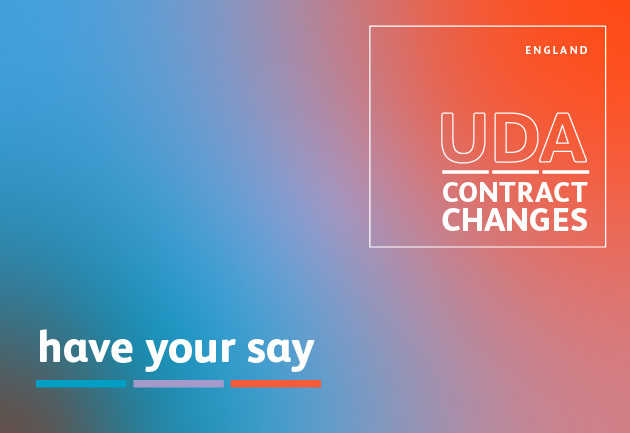
Proposed changes to the UDA contract: The positives
While there is still room for improvement, we have secured critical wins in this package of contract change proposals
The Government's proposed changes to the UDA contract were consulted on over summer 2025. These include meaningful improvements, but they can be better and are certainly not the final destination – phasing out the UDA entirely.
We submitted a formal response, and below we highlight the critical wins in the Government's current UDA proposal. This formed the basis of our consultation responses.
Make sure to also read our analysis of how the proposals can be improved further.
1. Care for high needs patients: Care packages
One of the biggest problems with the UDA system is that it underpays for treating patients with complex or high needs. The current UDA bands do not reflect the real time, cost or effort involved in delivering advanced care.
- Under the proposed changes, patients with very high needs will be eligible for new care packages, paid at higher rates than before
- The new care packages build on our progress from 2022, aiming to properly recognise and reward the work dentists do for patients whose needs go far beyond what the current UDA bands were designed to cover
- We have fought to fix the long-standing under-remuneration for periodontal treatment. This is now recognised in two care pathways and the payments have increased by hundreds of pounds
What does this mean for you?
- You will be able to provide care for high needs patients over longer periods, in a way that makes clinical sense, without having to worry about 'staged treatments' or the 'Notes for the Avoidance of Doubt'
- Payments for these new care packages will be worth set national amounts in pounds, not UDAs, removing variation in value between practices
- Because of the way the contract works, those set amounts will need to be converted into UDAs, but that means anyone with a lower UDA value will receive more UDA credit
- Where a lab-made appliance is needed as part of the course of treatment (CoT), you can claim a band three in addition to the first and second care packages
- For example: treatment involving five or more carious teeth into dentine, including a bridge, would be worth £272 plus 12 UDAs, a total of around £656
2. Care for high needs patients: Dentures
- We highlighted to NHS England that payments for denture modifications, repairs, rebasing and relining do not even cover the lab fees involved.
What does this mean for you?
- Payments for denture modifications will now be worth two UDAs
- These can be claimed in addition to a band two CoT or one of the care packages.
3. Prevention
NHS dentistry has long failed to properly recognise the time and value involved in delivering preventive care.
- We have consistently called for prevention to be given the priority and funding it deserves
- The new proposals include enhanced payments for delivering evidence-based preventive care – a step toward making prevention a core part of NHS dentistry.
What does this mean for you?
- You will be able to provide fluoride varnish as a separate CoT, without needing to carry out a full examination
- This will be paid at 0.5 UDAs
- This means children with higher clinical needs can be brought in between regular check-ups for fluoride varnish applications and you will now be paid for delivering that care
- Resin-based fissure sealants will be rebanded into band two
- This treatment will now be worth between three and five UDAs, depending on how many teeth are treated.
4. Urgent care
The current UDA model does not adequately support urgent care. It fails to recognise the actual costs of treatment and ignores the risks and resources involved in keeping urgent slots available, especially when patients do not attend.
- Our view is that sessional payments are the most effective way to deal with this situation
- We have secured proposals for improved payment arrangements for urgent care.
What does this mean for you?
- The payment for an urgent CoT will nearly double, increasing to a national rate of £70
- You will receive a £5 payment to begin recognising the cost of holding appointments open, even if the patient does not attend or the appointment is not filled
- These improved payment terms are linked to a requirement for practices to offer a set level of urgent care appointments as part of their NHS commitment.
5. Peer review and clinical audit
The introduction of the UDA contract removed supportive peer review and clinical audit schemes, removing valuable tools for professional development and quality improvement.
- We have consistently called for the reintroduction of positive, funded, peer review and clinical audit schemes that support dentists and their teams to deliver high-quality care
- NHS England is proposing to fund peer review and clinical audit schemes for an initial three-year period.
What does this mean for you?
- Each practice will receive £3,400 a year meaning that your efforts in this area will be recognised and funded
- The whole dental team will be encouraged and supported to engage in an annual quality improvement project.
6. Making the NHS package more attractive: Appraisals
Through these proposals, we’ve argued for steps to be taken to make the overall NHS package more attractive to dentists.
- The existing contract says appraisals should be done within practices, but to date it has been unfunded and therefore rarely implemented.
- We know that professional and career development is a major frustration for dentists working within the NHS. Funding for annual structured review conversations about development goals will help to ensure they take place for all and are given the appropriate level of importance.
What does this mean for you?
- Appraisals will now be funded at six UDAs per clinical team member
- This is a welcome step, though we remain concerned that six UDAs may not fully reflect the time and effort needed to deliver a meaningful appraisal
7. Making the NHS package more attractive: Benefits
- We challenged the unfair eligibility criteria for some NHS benefits, in particular the rule that dentists must be on the NHS Performers List for two years to qualify for maternity pay.
What does this mean for you?
- All your NHS service, including time spent in Dental Core Training in hospitals, will nowt count towards the qualifying period for NHS benefits.
- This change makes access to benefits fairer and better reflects the structure of modern dental careers.
Impact on associates

